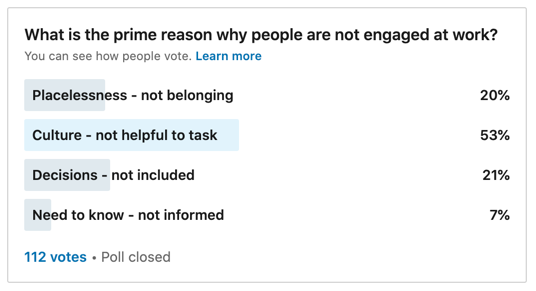Cultural change is the hardest part of digital transformation, where the need is to be empowering staff to continually challenge the status quo, to experiment often, and to get comfortable with failure. The challenges of leading change are well documented, so we won’t repeat them here.
However, it’s worth asking ourselves what do we mean when we talk about ‘cultural change’?
Wikipedia defines organisational culture as influencing the way people interact, the context within which knowledge is created, the resistance they will have towards certain changes, and ultimately the way they share (or the way they do not share) knowledge. Organisational culture represents the collective values, beliefs and principles of the company.
This could be summarised as ‘the behaviour of staff and the meaning that others attach to those behaviours’. It’s all a bit vague.
Another perspective is to focus on the way that employees are valued and treated.
Core Values are a companion statement often created along with the company Vision and Mission, setting out policy and corporate behaviours to be used on the digital transformation journey. Many organisations attempt to create an environment that reflects these values, which, if followed, should result in business success and a recognition of the employees' part in it.
This usually requires significant effort to engage with the staff and create an emotional commitment in them to the organisation, and in its success.
If done well, employees stay late to get the job done, they support their team mates, they share knowledge and they have the confidence to make decisions. They demonstrate an enthusiasm and a holistic care because they feel committed and accountable.
These are exactly the behaviours needed in a product-led, cross-functional, customer-centric value delivery organisation - the aim of whole-company digital transformation.
Below are the results from a poll I ran on Linked In from 3 July to 10 July 2020.

I find the results interesting, having expected the votes to build from the first to last option, with ’Need to know’ taking the most votes. I thought this because so many people at clients tell me that they aren’t included in any decision making, even though it might be relevant to them; and that leadership don’t usually communicate with them, other than through formal ‘big message’ emails which are later posted on the corporate internet. If their managers do onward cascade a message, then its through rather awkward broadcasting at a town hall or via a weekly email, when the delivery is never quite the same in content or tone.
Both of these weaknesses - not being included in decision making and not being informed of what is happening in their part of the business - are solved when the company moves to being that product-led, cross-functional, customer-centric value delivery organisation.
The most votes to the question ‘What is the prime reason why people are not engaged at work’ went to the Culture option.
Particularly resonant comments included:
- I think that for real engagement there needs to be an emotional connection to work
- I’m a firm believer of leadership being pivotal to the whole debate
- Sometimes disengagement is seen as 'doesn't care' by senior managers
- Changing culture is one of the hardest things to do
- I believe that all 4 options play an important role together
- The more you can involve people in the business and make it theirs, the more they will take responsibility and be determined to succeed
- Culture is clearly a big factor
- Engaged staff are what makes the difference between good and great outcomes.
Success in engaging employees seems to come from leadership investing the time, energy and commitment to create a change in culture.
We could conclude therefore that cultural change actually means employee engagement, and that is why so many respondents chose the Culture option in the poll.
Did you spend time with your team today? Did you listen to their hopes and dreams, did you ask for their opinion when a decision was needed, did you tell them of the change in procedure, did you praise them for a job well done? Did you make them feel enthused, inspired, valued?
